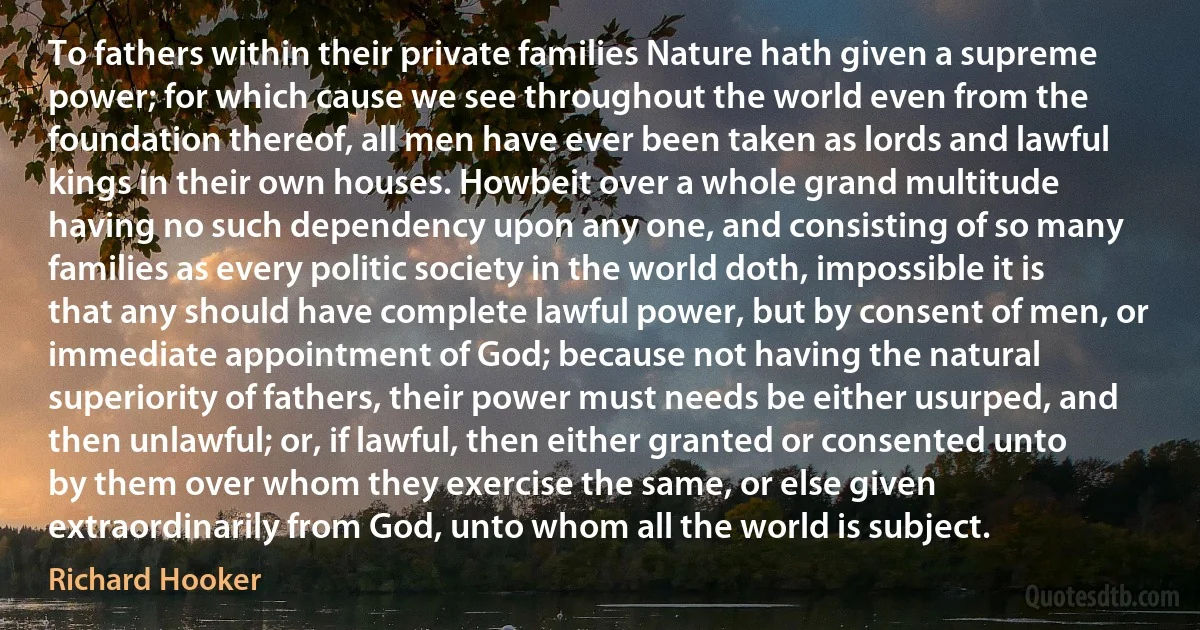Superiority Quotes - page 14
No one has yet discovered or ever shall discover what God is in His nature and essence... we shall, in time to come, 'know as we are known' (I Cor 13:12). But for the present what reaches us is a scant emanation, as it were a small beam from a great light - which means that any one who 'knew' God or whose 'knowledge' of Him has been attested to in the Bible, has a manifestly more brilliant knowledge than others not equally illuminated. This superiority was reckoned knowledge in the full sense, not because it really was so, but by the contrast of relative strengths.

Gregory of Nazianzus
Clever men will recognize and tolerate nothing but cleverness; every authority rouses their ridicule, every superstition amuses them, every convention moves them to contradiction. Only force finds favor in their eyes, and they have no toleration for anything that is not purely natural and spontaneous. And yet ten clever men are not worth one man of talent, nor ten men of talent worth one man of genius. And in the individual, feeling is more than cleverness, reason is worth as much as feeling, and conscience has it over reason. If, then, the clever man is not mockable, he may at least be neither loved, nor considered, nor esteemed. He may make himself feared, it is true, and force others to respect his independence; but this negative advantage, which is the result of a negative superiority, brings no happiness with it. Cleverness is serviceable for everything, sufficient for nothing.

Henri-Frédéric Amiel
Generals were in every essential particular inadequately prepared for the contingencies which confronted them in this War. Had they been men of genius-which they were not-they could have adapted themselves more quickly and effectively to the new conditions of war. They were not equipped with that superiority in brains or experience over an amateur steeped in the incidents and needs of the War which would justify the attitude they struck and the note of assured pastmastership they adopted towards all criticism or suggestion from outside or below.

David Lloyd George
Those who have studied the nutritional conditions of "primitive” Africans in tropical Africa are unanimous in stating that they show no clinical signs of dietary deficiency. One of the most striking indications of the superiority of indigenous African diet is the magnificent condition of the teeth. One researcher among six ethnic groups in Kenya could not find a single case of tooth decay, not a single deformation of dental arch. But when those same people were transplanted and put on the "civilized” diet available under colonialism, their teeth began to decay at once.

Walter Rodney
Imperialist powers are blinded by tradition, prestige and self-interest, and vainly imagine that it is for the good of humanity that they should perpetuate their rule and continue to bear "the white man's burden." Their assumption of superiority and the contemptuous way in which they often treat the "natives" is humiliating and degrading.

Kirby Page
It is incomprehensible to me that any thinker can calmly call himself a modernist; he might as well call himself a Thursdayite. ... The real objection to modernism is simply that it is a form of snobbishness. It is an attempt to crush a rational opponent not by reason, but by some mystery of superiority, by hinting that one is specially up to date or particularly "in the know." To flaunt the fact that we have had all the last books from Germany is simply vulgar; like flaunting the fact that we have had all the last bonnets from Paris. To introduce into philosophical discussions a sneer at a creed's antiquity is like introducing a sneer at a lady's age. It is caddish because it is irrelevant. The pure modernist is merely a snob; he cannot bear to be a month behind the fashion.

G. K. Chesterton
There is one writer, and, perhaps, many who do not write, to whom the contraction of these pernicious privileges appears very dangerous, and who startle at the thoughts of England free, and America in chains. Children fly from their own shadow, and rhetoricians are frighted by their own voices. Chains is, undoubtedly, a dreadful word; but, perhaps, the masters of civil wisdom may discover some gradations between chains and anarchy. Chains need not be put upon those who will be restrained without them. This contest may end in the softer phrase of English superiority and American obedience.
We are told, that the subjection of Americans may tend to the diminution of our own liberties; an event, which none but very perspicacious politicians are able to foresee. If slavery be thus fatally contagious, how is it that we hear the loudest yelps for liberty among the drivers of negroes?

Samuel Johnson
The real objection to the great majority of cats is their insufferable air of superiority. Cats, as a class, have never completely got over the snootiness caused by the fact that in Ancient Egypt they were worshipped as gods. This makes them too prone to set themselves up as critics and censors of the frail and erring human beings whose lot they share.

P. G. Wodehouse
The robots are not technologically minded. They were not built to be. They were built to bolster human vanity and pride, to meet a strange longing that seems to be built into the human ego-the need to have other humans (or a reasonable facsimile of other humans) to minister to our wants and needs, human slaves to be dominated, human beings over which a man or woman (or a child) can assert authority, thus building up a false feeling of superiority.

Clifford D. Simak
The sentiment that dominates all Rousseau's works is a certain plebeian anger that excites him against every kind of superiority. The energetic submission of the wise man bends nobly under the indispensable empire of social distinctions, and never does be appear greater than when he bows; but Rousseau has nothing at all of this loftiness. Weak and surly, he spent his life spouting insults to the great, as he would have offered the same to the people if he had been born a great lord.

Joseph de Maistre
I'd like to be remembered as someone who kept the comic novel going for another generation or so. I fear the comic novel is in retreat. A joke is by definition politically incorrect - it assumes a butt, and a certain superiority in the teller. The culture won't put up with that for much longer.

Martin Amis
Notions of objectivity, removed scientific inquiry, unbiased scholarly assessments, empiricism, standardized tests, universalism, evolutionism, and Eurocentric thinking are a few of the many constructs that academics, politicians, and benefactors used to mask the preponderance of whiteness-white ideas, people, and scholarship-as normal. Thus, white racists and capitalists and black accommodationists actively created and maintained this white normality by masking it, by removing the adjectives, by denigrating and downgrading everything non-European, everything outside of the Eurocentric or capitalist homily. European history and literature were not presented as such. Academics labeled it the history and literature. By conceiving of European (and Euro-American) scholarship as superior to all others, they racialized it, they gave it whiteness-an officious social construct of racial superiority.

Ibram X. Kendi
Foolish and vain indeed is the workingman who makes the color of his skin the stepping-stone to his imaginary superiority. The trouble is with his head, and if he can get that right he will find that what ails him is not superiority but inferiority, and that he, as well as the Negro he despises, is the victim of wage-slavery, which robs him of what he produces and keeps both him and the Negro tied down to the dead level of ignorance and degradation.

Eugene V. Debs
...Jews seem to have superiority as actors, chess-players, doctors, merchants (chiefly financiers), in metaphysics, music, poetry, and philology.... Of course, Jews have no Darwin. It took England 180 years after Newton before she could produce a Darwin, and as Britishers are five times the number of Jews, even including those of Russia, it would take, on the same showing, 900 years before they produce another Spinoza, or, even supposing the double superiority to be true, 450 years would be needed.

Baruch Spinoza
They were common folk, and their commonness radiated from them like heat from a stove....The wheelbarrow handle, it was plain, was more familiar to the men in that long line than the golf-stick, and the washtub had engaged the women far oftener than the lipstick.
But what of it? The klan is not a club for snobs, it is a device for organizing inferiorities into a mystical superiority.

H. L. Mencken
His superiority was, indeed, real and incontestable; he was the classical ornament of the anti-slavery party; their pride in him was unbounded, and their admiration outspoken.The boy Henry worshipped him, and if he ever regarded any older man as a personal friend, it was Mr. Sumner. The relation of Mr. Sumner in the household was far closer than any relation of blood. None of the uncles approached such intimacy. Sumner was the boy's ideal of greatness; the highest product of nature and art. The only fault of such a model was its superiority which defied imitation. To the twelve-year-old boy, his father, Dr. Palfrey, Mr. Dana, were men, more or less like what he himself might become; but Mr. Sumner was a different order - heroic.

Henry Adams
But, in my state of mind, this appearance of superiority to illusion added to the effect which Bentham's doctrines produced on me, by heightening the impression of mental power, and the vista of improvement which he did open was sufficiently large and brilliant to light up my life, as well as to give a definite shape to my aspirations.

John Stuart Mill
Dante has not deigned to take his inspiration from any other. He has wished to be himself, himself alone; in a word, to create. He has occupied a vast space, and has filled it with the superiority of a sublime mind. He is diverse, strong, and gracious. He has imagination, warmth, and enthusiasm. He makes his reader tremble, shed tears, feel the thrill of honor in a way that is the height of art. Severe and menacing, he has terrible imprecations for crime, scourgings for vice, sorrow for misfortune. As a citizen, affected by the laws of the republic, he thunders against its oppressors, but he is always ready to excuse his native city, Florence is ever to him his sweet, beloved country, dear to his heart. I am envious for my dear France, that she has never produced a rival to Dante; that this Colossus has not had his equal among us. No, there is no reputation which can be compared to his.

Napoleon Bonaparte
When you encounter those who are wicked, unrighteous, foolish, dim-witted, deformed, vicious, chronically ill, lonely, unfortunate, or disabled, you should think: "How can I save them?” And even if there is nothing you can do, at least you must not indulge in feelings of arrogance, superiority, derision, scorn, or abhorrence, but should immediately manifest sympathy and compassion. If you fail to do so, you should feel ashamed and deeply reproach yourself: "How far I have strayed from the Way! How can I betray the old sages? I take these words as an admonition to myself.”.

Ryōkan



